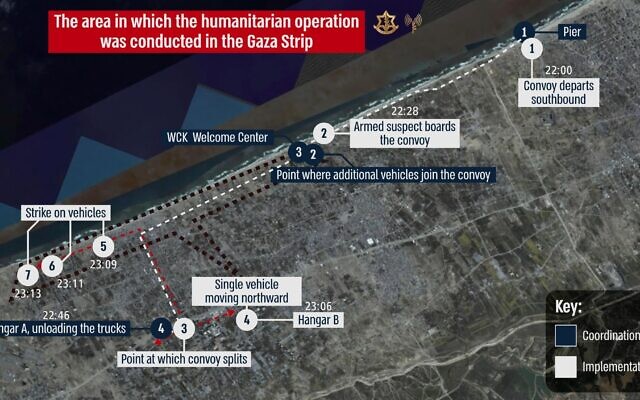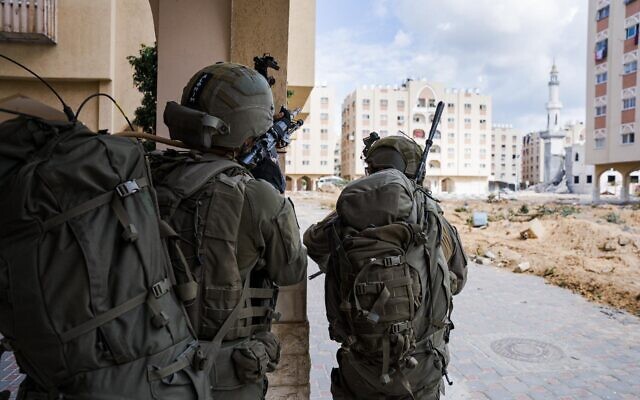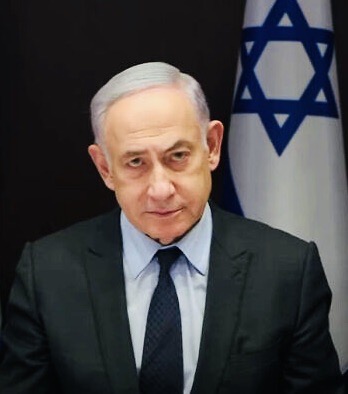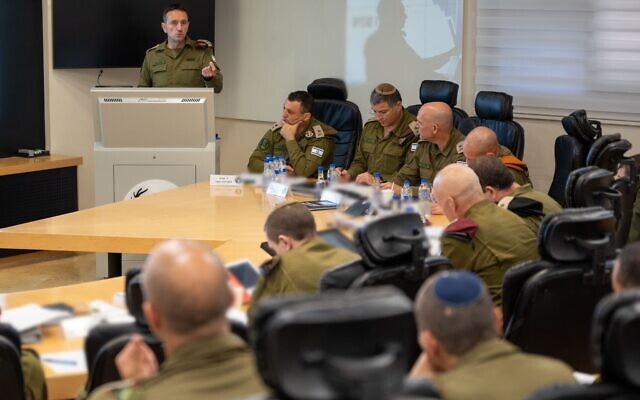It was a tense telephone conversation marking what may well be a turning point in Israel’s conduct of the war in the Gaza Strip and in its relationship with its key ally, the United States.
U.S. President Joe Biden, in a half-hour call to Israeli Prime Minister Benjamin Netanyahu on April 4, issued what amounted to an ultimatum following a tragic incident in which seven foreign aid workers in Gaza were killed by Israeli air strikes.
U.S. Vice-President Kamala Harris described the call as “candid and frank.”
In a sharp shift away from his unambiguously pro-Israel position on the Israel-Hamas war, Biden demanded tangible and timely steps from the Israeli government to ease the humanitarian crisis in Gaza. He also asked Israel to agree to an immediate ceasefire to facilitate the release of Israeli and foreign hostages held by Hamas.

Biden suggested that his attitude to Israel and the war might change if the Israeli government failed to abide by his demands. Until now, Biden has supported Israel’s campaign to eradicate Hamas and remove it from power.
Although Biden did not spell out measures he might use against Israel, observers speculated that he could limit the sale of offensive weapons to Israel.
This week’s tragedy occurred shortly after the United States determined that Israel was in compliance with a National Security Memorandum that mandates countries receiving American security assistance to provide “credible and reliable written assurances” that they will “facilitate and not arbitrarily deny, restrict, or otherwise impede, directly or indirectly, the transport or delivery” of U.S. and US-supported humanitarian assistance.
Bowing to U.S. pressure, Israel announced several concessions which apparently satisfies the United States.
The port of Ashdod Port will be temporarily open to deliveries of humanitarian aid. The Erez crossing point in northern Gaza will be reopened for the first time since Hamas’ surprise attack on October 7. The quantity of assistance from Jordan moving through the Kerem Shalom crossing will be increased.
In addition, two senior army officers were dismissed and several top commanders, including the commander of the southern front, General Yaron Finkelman, were formally censured for their involvement in the deadly strike.

However, Israel has not agreed to an immediate truce. But in line with Biden’s request that Israeli negotiators should conclude a hostage deal “without delay,” Israeli officials returned to Qatar to resume talks to free the last remaining hostages.
This dramatic turn of events unfolded in the wake of a disturbing incident on April 1 that aroused international indignation and anger.
Israeli drones struck three cars carrying six foreign aid workers and a Palestinian driver, all affiliated with World Central Kitchen, a charity run by the Spanish-American celebrity chef Jose Andres. The vehicles were marked with World Central Kitchen logos and were travelling at night.

This incident reminded observers of a mass casualty event in northern Gaza on February 29 during which hundreds of Palestinians swarmed an aid convoy. In the ensuing stampede, dozens were fatally run over by trucks and killed by Israeli gunfire.
Mistakes are not uncommon in warfare.
During the 1967 Six Day War, Israeli aircraft and naval vessels attacked the USS Liberty, a U.S. spy ship, off the coast of the Sinai Peninsula, mistaking it for an Egyptian vessel. Thirty four U.S. sailors were killed and 171 were wounded. Israel apologized and paid compensation to the tune of $30 million to the families of the deceased.
In 1996, during Operation Grapes of Wrath in southern Lebanon against Hezbollah, Israeli artillery fired on a United Nations compound in Qana, killing 106 Lebanese civilians. Israeli gunners thought they had struck a nearby Hezbollah position.
Shortly after the attack in Gaza, Andres spoke to Biden, urging him to end the war and accusing Israel of deliberately targeting the convoy. Claiming that the Israel Defence Forces had been informed of the convoy’s movements, Andres said, “This was not just a bad luck situation where ‘oops’ we dropped the bomb in the wrong place. ”
Biden, who had been repeatedly urging Israel to act with restraint in its air and land offensive in Gaza, said he was “outraged and heartbroken” by the deaths of the workers — a Pole, an Australian, three Britons, a dual U.S.-Canadian citizen and a Palestinian resident of Gaza. He claimed that Israel had not done enough to protect Palestinian civilians.

Biden’s critique was not new.
On March 10, in a rebuke of Netanyahu, he said, “He has a right to defend Israel, a right to continue to pursue Hamas, but he must, he must, he must pay more attention to the innocent lives being lost as a consequence of the actions taken.”
And he added, “In my view, he’s hurting Israel more than helping Israel. It’s contrary to what Israel stands for, and I think it’s a big mistake. So I want to see a ceasefire.”
Previously, the Biden administration consistently endorsed Israel’s argument that a premature truce would only benefit Hamas. But as the civilian death toll rose into the tens of thousands, as some supporters of the Democratic Party lambasted his policy toward Israel, and as surveys indicated that slightly more than half of American adults disapproved of Israel’s military tactics, Biden pivoted.

In accordance with this expedient shift, Biden notified Netanyahu that he opposed an Israeli ground invasion of Rafah, Hamas’ last major stronghold.
Biden’s incremental misgivings about Israel’s overall military operation in Gaza reached a climax yesterday despite contrite statements from Netanyahu and Herzi Halevi, the chief of staff of the Israeli armed forces.

Calling the incident on April 1 “tragic,” “unintended” and a “grave mistake,” Netanyahu vowed that a thorough investigation would be launched. He also said that “these things happen in war,” a comment that did not go down well abroad.
Halevi called the strike “a mistake that followed a misidentification, at night, during a war, in very complex conditions.” He acknowledged that it should not “have happened” and said Israel had no “intention of harming aid workers.”

Halevi’s comment, though sincere, fell short of explaining why Israel, which has a proven track record of carrying out surgical strikes against its enemies, had misidentified the convoy.
Biden, in his conversation with Netanyahu on April 4, let it be known in no uncertain terms that the United States could no longer tolerate the bloodbath in Gaza, which has claimed the lives of 33,000 Palestinians, including more than 13,000 combatants.
As a White House summary of Biden’s call to Netanyahu noted, “President Biden emphasized that the strikes on humanitarian workers and the overall humanitarian situation are unacceptable. He made clear the need for Israel to announce and implement a series of specific, concrete, and measurable steps to address civilian harm, humanitarian suffering, and the safety of aid workers. He made clear that U.S. policy with respect to Gaza will be determined by our assessment of Israel’s immediate action on these steps.”
Harris underscored this point. “If there are not changes to (Israel’s) approach, it’s very likely we’re going to change our approach,” she said.
U.S. Secretary of State Antony Blinken said that U.S. support would be curtailed if Israel did not adjust its tactics in Gaza. “If we don’t see the changes that we need to see, there will be changes in our policy,” he said.
He warned that Israel risks becoming indistinguishable from Hamas if it does protect civilians. “Democracies place the highest value on human life … That’s our strength. It’s what distinguishes us from terrorists like Hamas. If we lose that reverence for human life, we risk becoming indistinguishable from those we confront.”
“Right now, there is no higher priority in Gaza than protecting civilians, surging humanitarian assistance, and ensuring the security of those who provide it. Israel must meet this moment,” Blinken added.
He said that Israel had taken “important steps” to allow aid into Gaza, but noted that “the results on the ground have been woefully insufficient and unacceptable.”
Hewing to this theme, White House national security spokesman John Kirby called on Israel to take “tangible” and “concrete” steps to alleviate the situation. “If there’s no changes to their policy in their approaches, then there’s going to have to be changes to ours,” he said. “There are things that need to be done. There are too many civilians being killed.”
According to Americans for Peace Now, Israel has been less than cooperative in allowing aid into Gaza: “Throughout the course of the conflict, the Israeli government has consistently restricted and severely limited the number of humanitarian aid trucks, imposed arbitrary and contradictory criteria for Israel’s inspection mechanisms, and interfered with or created obstacles to the delivery of aid, including the failure to protect humanitarian staff from bombardment and other dangers. Gaza now faces the threat of widespread famine. By impeding the delivery of humanitarian aid and by targeting and ignoring the safety of aid workers, the Israeli government has rendered Israel ineligible for the continued delivery of US offensive weapons.”
Much to Israel’s relief, Biden stopped short of suspending or curtailing arms shipments to Israel, as previous U.S. presidents, such as Gerald Ford and Ronald Reagan, have done.
On April 2, the Biden administration announced that it would proceed with an $18 billion plan to sell up to 50 F-15 fighter jets to Israel after disclosing that Israel would buy more F-35 stealth aircraft.
In explaining U.S. policy, Blinken said that the United States was determined to protect Israel’s wider security interests. As he put it, “It’s also about the threats posed to Israel by Hezbollah, by Iran, each of which has vowed … to destroy Israel.”
Earlier, a group of Democratic U.S. senators, including Bernie Sanders, urged Biden to cut off military sales to any country that restricts the delivery of humanitarian aid. “Israel has the right to defend itself,” Sanders said last month. “But Israel does not have the right to go to war against the entire Palestinian people.”
Clearly, the mood in the United States has shifted, much to Israel’s detriment.
